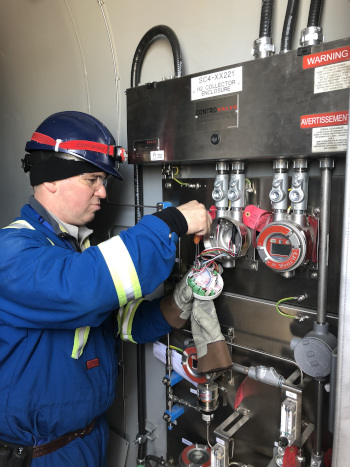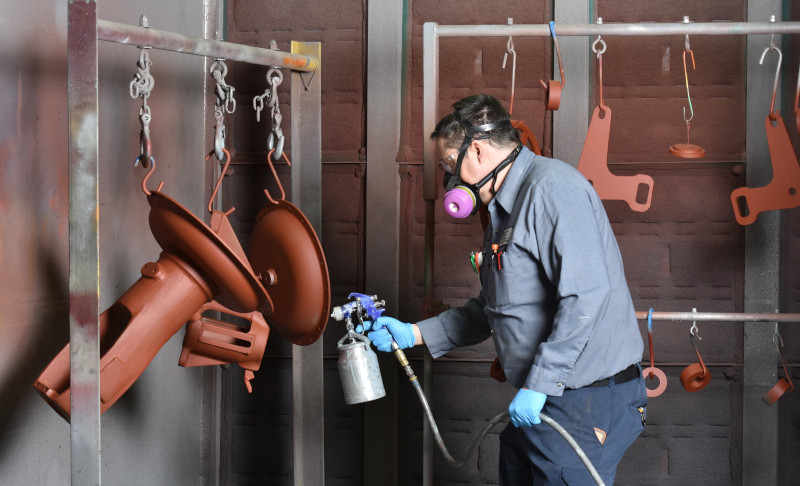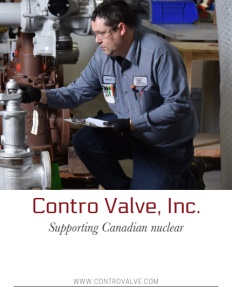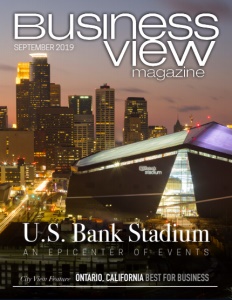Contro Valve, Inc.
Supporting Canadian nuclear
Business View Magazine interviews representatives of Contro Valve Inc., for our focus on Strength & Growth of the Canadian Nuclear Energy Sector Supply Chain.
Since 1977, Contro Valve Inc. has been eastern Canada’s leading provider of valves and instrumentation solutions to industries including power generation, pulp and paper, water treatment, chemicals, refining, pipelines, electricity distribution, and many more. A proud member of OCNI (Organization of Canadian Nuclear Industries), Contro Valve has been serving the four Candu power generation stations in Canada for more than 20 years with high quality valves and instruments. The company also serves the nuclear research facilities in Chalk River, Ontario. The dedicated Contro Valve nuclear product team, based in Burlington, Ontario, understands intimately the rigorous quality and documentation requirements of this industry; as such, they are fully qualified to act as a stocking distributor for Nuclear Class products, capable of receiving, inspecting, and shipping directly to nuclear industry customers.
Business View Magazine recently spoke with Michael Wilson, President of Contro Valve, Inc.; Gino Salvo, Ontario Manager; Dustin Fournier, Account Manager (Nuclear); and Chris Tremblay, Senior Sales Manager (Nuclear) about the company’s current operations and growth plans, as well as their insights into the evolving nuclear industry in Canada and beyond. The following is an edited transcript of that conversation.
 BVM: Could you give an overview of operations at Contro Valve?
BVM: Could you give an overview of operations at Contro Valve?
Wilson: “The company has been in business for 42 years. We have offices across eastern Canada and our main office for handling the nuclear business is in Burlington, Ontario due to the Ontario Power Generation (OPG) and Bruce Power plants being close by. New Brunswick Power is run locally, but they feed all technical matters and questions back through the Burlington office. We’re the appointed representative for Consolidated and Mason-Neilan equipment to the nuclear market in Canada and we started selling Consolidated safety relief valves and Mason-Neilan control valves to Bruce Power and OPG in 1995. There’s a large installed base of those valves in OPG, Bruce Power, and New Brunswick Electric Power, so we immediately started to service that, but our qualifications, at the time, in relation to handling nuclear orders, needed some work.”
Fournier: “Originally, our Contro Valve quality program was ISO9001. When we first started dealing with the nuclear industry in 1995, we only handled commercial products – mainly because the manufacturer had a presence here in Canada and had all their ASME code and CSA requirements to handle the nuclear products for the sites, so they did that, directly. When that presence ceased in 2004, we had to augment our quality program to meet the CSAZ299.3 program, initially, so we could handle supplying most products to the sites in Canada.
“Since then, we’ve increased our capabilities more, actually at the request of the end users. We’re now capable of handling nuclear code material in our facility, which involved adding another section to our quality manual that specifically meets the requirements of being a stocking distributor for code material for the Mason-Neilan and Consolidated brands. Our quality manual is broken down into a Corporate Quality System manual and then we have individual quality manuals for each of our locations. And our Burlington facility has a specific manual to handle the nuclear products.”
BVM: Who are your main suppliers, and is there a lot of competition in your sector?
Wilson: “Without GE we would not be a very significant supplier to the nuclear industry. We also sell a lot of Yokogawa products, especially at Bruce Power for some big projects, recently. And we represent Valve Technologies out of Houston and do a lot of work with them.”
Tremblay: “The Consolidated and Mason-Neilan lines are supplied by GE. They are industry leaders; we’re always involved in proposals and RfQs (Request for Quotation). For any big projects, they’ll come to us, especially when they’re in tough spots with older valve designs that aren’t supported anymore. We’re recognized as one of the bigger suppliers of valves. But there is definitely competition.”
Salvo: “The competition for nuclear is very different than all our other industries like oil and gas, or petrochemical, or pharmaceutical, because to sell into the nuclear industry you need to have a qualification. There is only a limited number of companies with those qualifications that can sell, especially into the area that is pure nuclear. On the commercial side of the plant, or what they call balance of plant, it opens up to a number of competitors because the qualifications are reduced to a level where, in some cases, an ISO program is sufficient. But when you get into the nuclear side, the number of competitors is reduced significantly versus other industries that we deal with.”
BVM: Is training does on a continuous basis?
Salvo: “In this location in Burlington we have 35 employees. The commercial side, we handle just like our other daily business, but on the nuclear side, it’s really limited as to who can actually work on that product.”
Tremblay: “Through our quality manual we have training requirements for employees. So, anyone who will be specifically involved with our nuclear business would have different training; As we implemented the latest quality revisions to bring through code products, Peter Hack, our Quality Manager, came to Burlington and did training of what the changes would be and how we’d be implementing them. He trained our shipper/receiver in the process of receiving goods and how we store them. It’s all documented and signed off, and he keeps control of that.”
Fournier: “We haven’t seen ISO change in quite a few years. ASME code hasn’t been changed in a long time, either. But there are big changes coming in the next couple of years, especially in Canadian nuclear. They’re updating the CSA ‘N’ standard that was N285 since, I think, the 1990s and that’s going to affect everyone. But usually, we go decades without changes.”

BVM: What are the biggest challenges in the nuclear industry, from your perspective?
Tremblay: “The challenges are more faced by manufacturers. With all the restrictions to how material is purchased and the inspections they have go through in manufacturing, it’s a very long process to provide nuclear code valves – with a lot of potential hiccups along the way that can cause setbacks. That’s the main issue during manufacturing; the amount of QA requirements that go into it.”
Fournier: “One of our biggest challenges, since the equipment was made long ago and the products last so long, is obsolescence. And supporting these old products that are still working with parts that the customers need. The equipment just keeps getting older and older and the manufacturers are moving forward with new products. Getting them to stay on board with keeping those old legacy products available and supported is becoming more of a challenge.”
Salvo: “What we’re looking at now is that both Bruce Power and OPG have committed a tremendous amount of money and effort to refurbish both plants. The other issue is the Pickering facility that was slated to close in 2024 and there have been rumors about extending life on that. And there was also discussion about putting in a new unit somewhere. Our goals, short-term, are working on these plants and assisting and supporting them with product.
“Because the plants are so old and a lot of products are obsolete, a number of manufacturers are not supporting these products any longer, and that’s putting a damper on the nuclear industry. They try to avoid the cost and effort of replacement, but they’re at a point where they’re going to have to make some changes. We were told by OPG that they’re looking at options that may become available during this refurbishment. So, short-term, that could be an opportunity for us.”
BVM: What objectives are on the agenda for the next five years?
Tremblay: “Internally, Contro Valve has been implementing digital systems for tracking orders. There’s a lot of moving parts with nuclear orders, a lot of different people involved at the customer end and the factory end. We have an in-house person who designs custom software to help us efficiently manage these orders. So, we’re continuing to grow that side of things to ensure we’re as efficient as possible. With this digital system, we’re going paperless, and even our technicians are moving that way.
“The big thing is the refurbishment projects at OPG and Bruce Power; they’ll be ongoing for years to come. We’re getting a lot of business as they are shutting these units down longer and replacing valves that they didn’t have the opportunity to do before. The nuclear industry is slow to evolve – five years from now, we fully intend to be right in the middle of these refurbishments, give the support, and make sure it is successful, so they keep receiving funding and the industry stays strong in Ontario.”
Fournier: “We are committed to being that voice for the nuclear industry to the manufacturers and, hopefully, address their issues of obsolescence; to represent the end user to the manufacturers and keep stressing their needs. We strive to be a top-tier customer for the nuclear industry and we’re inspired to continue to improve on areas that help us and the industry to get better.”
AT A GLANCE
Who: Contro Valve Inc.
What: Provider of valves and instrumentation solutions
Where: Nuclear industry base in Burlington, Ontario
Website: www.controvalve.com



